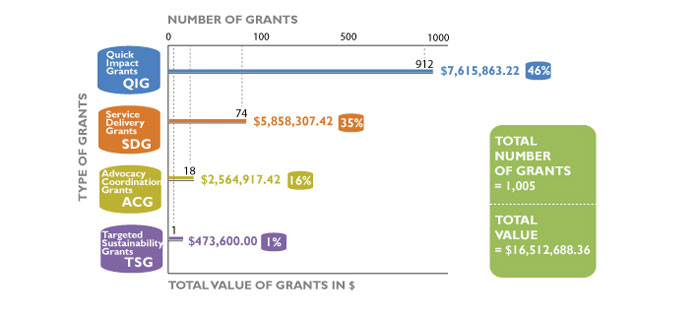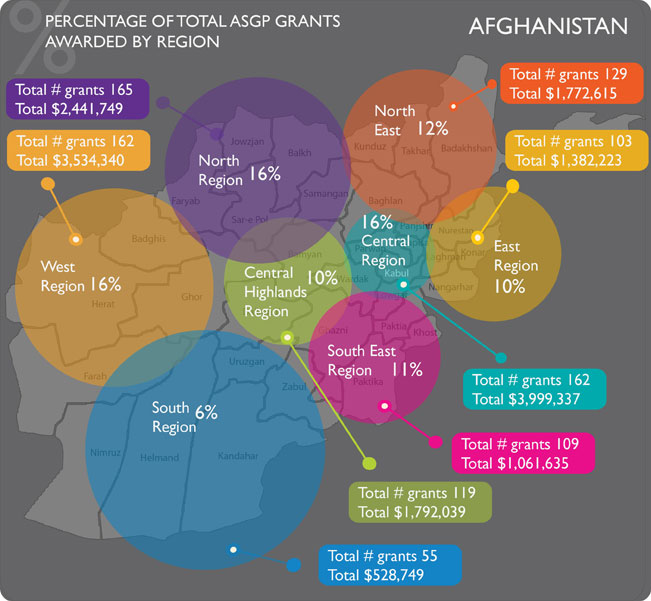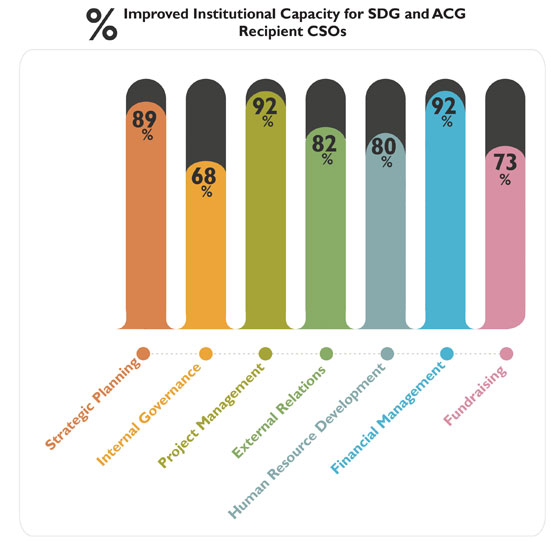Grants
ASGP directly empowered 418,145 Afghan women and girls and indirectly reached more than 6.1 million Afghan men and women, primarily women, through program initiatives. ASGP supported nascent to mature civil society organizations (CSOs) to improve their capacity, bolster their operations, expand markets and better deliver services to the community. 978 grants were successfully completed, bringing the total dollar value of successfully completed grants to $15,721,171. 343 new women’s groups were registered as CSOs with the Government of Afghanistan, giving them access to future donor funding and additional Afghan Government support. These newly established CSOs were also able to provide services to many areas of the country that had never seen development programming, let alone programming for women.
ASGP awarded four types of grants: Quick Impact Grants, Service Delivery Grants, Advocacy Coordination Grants and a Targeted Sustainability Grant.
- Quick Impact Grants (QIG) helped small, rural organizations and women’s groups to rapidly provide goods and services, and develop improved skills to enable them to become more active in their communities. Awarded in all 34 provinces.
- Service Delivery Grants (SDGs) funded one-year projects to increase the organizational and programmatic capacity of organizations to provide access to reproductive health, education and literacy, economic development, peaceful co-existence, awareness, and other issues relevant to women in Afghanistan. Awarded in Badakhshan, Baghlan, Badghis, Balkh, Bamyan, Daykundi, Hirat, Kabul, Kapisa, Farah, Ghazni, Ghor, Jawzjan, Nangarhar, Parwan, Panjshir, Samangan, and Saripol.
- Advocacy Coordination Grants (ACGs) helped urban and more established organizations imphttp://www.omid.asgp-gender.com/wp-admin/post.php?post=629&action=editrove their advocacy efforts for democratic, institutional and policy change. ACG recipients formed the Afghan Women’s Advocacy Coalition (AWAC) and launched campaigns to promote access to education for girls, access to justice for women, coalition building for economic opportunities, community-based women’s organization networks, and address gender-based violence. ACGs reached 31 provinces.
- Targeted Sustainability Grant (TSG): To create a sustainable organization to effectively manage donor-support for women-focused Afghan CSOs after the close of ASGP, the Afghan Women’s Education Center (AWEC) received a grant to enhance all aspects of their capacity building and grants management.
 Grants were awarded in all 34 provinces of Afghanistan and in 50% of the districts across the country. The regional distribution of grants is illustrated below.
Grants were awarded in all 34 provinces of Afghanistan and in 50% of the districts across the country. The regional distribution of grants is illustrated below.
Creative designed a tailored grants program to build the institutional capacity of Afghan CSOs. Creative utilized the Institutional and Gender Audit (I&GA) tool to assess the institutional capacity of SDG and ACG recipient CSOs before and after grant implementation. The I&GA built CSO capacity and gender equality in External Relations and Advocacy, Fundraising, Project Management, Strategic Planning, Human Resources, Financial Management and Internal Governance. Based on areas identified for strengthening in larger CSOs, Institutional Strengthening Plans (ISPs) were developed for each CSO. The graphic below illustrates the improved institutional capacity observed in CSOs after the completion of the I&GA process and targeted capacity building support.

